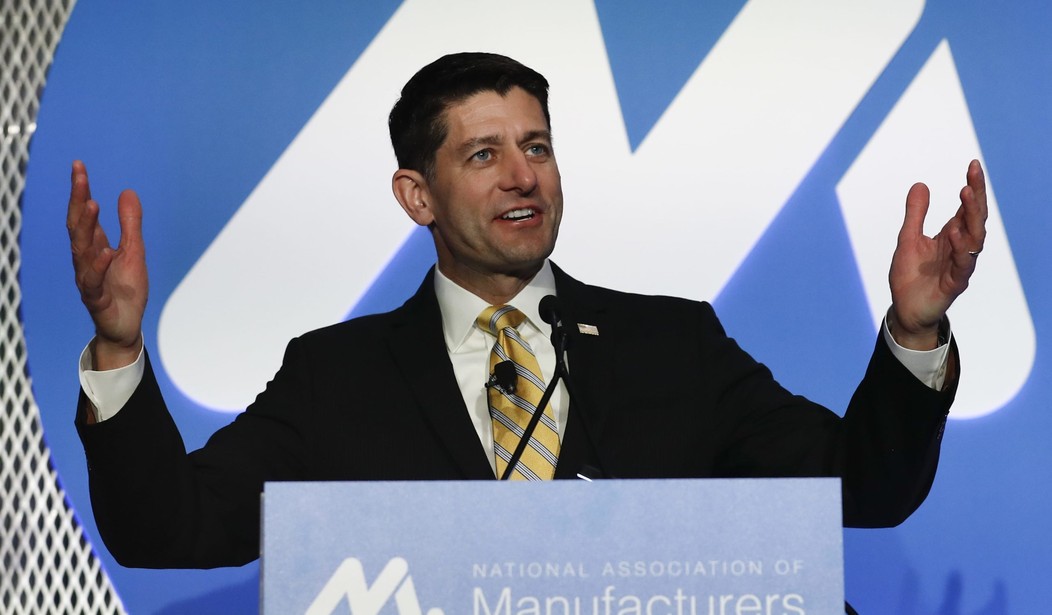WASHINGTON – In his first major speech on comprehensive tax reform, House Speaker Paul Ryan (R-Wis.) on Tuesday expressed confidence that Congress will pass comprehensive policy this year, despite the early struggles of healthcare reform.
After Republicans failed in March to move the original GOP healthcare bill through Congress, Ryan admitted that the failure would make efforts on tax reform more difficult. President Trump subsequently committed to efforts on tax reform, saying it should have been the initial objective.
Focus has since shifted back to healthcare, with the House in May passing legislation to dismantle the Affordable Care Act. Democrats have heavily criticized Senate Republicans for engaging in “secret” negotiations to craft the upper chamber’s version, blasting Republicans for refusing to show the public the bill.
Trump, who initially lauded the House version of the bill, reportedly called the bill “mean” during a closed-door discussion with Senate Republicans. Democrats have repeatedly latched onto those remarks, pointing to the loss of insurance for about 20 million Americans and the estimated $800 billion in cuts to Medicaid as “mean.”
On Tuesday, Ryan called tax reform a “once-in-a-generation, transformational” opportunity for America, while vowing to pass permanent corporate tax cuts that he believes will create well-paying, in-demand jobs, while encouraging companies to operate domestically.
“It is a very ambitious plan, yes, but it has to be,” Ryan said during a speech before the National Association of Manufacturers. “I’m here to tell you. We are going to get this done in 2017.”
When asked about a potential timeline on passage, Ryan said that it’s “eminently doable” to get it done before the end of 2017, while it’s his personal goal to “get it done by gun-deer season,” which is the Saturday before Thanksgiving. That way, he said, American will have a new tax system in place for 2018.
Ryan said that Senate Majority Leader Mitch McConnell (R-Ky.), Treasury Secretary Steven Mnuchin and National Economic Council Director Gary Cohn have been meeting regularly with tax writers Sen. Orrin Hatch (R-Utah) and Rep. Kevin Brady (R-Texas) to craft the tax reform bill. The White House in April unveiled a one-page tax reform plan, which Democrats have criticized as a massive tax cut for the wealthy, which mirrors critical characterization of Trump’s American Health Care Act.
Trump has proposed eliminating the estate tax and alternative minimum tax, clearing out special-interest carveouts and strengthening incentives for home ownership, charitable giving and retirement savings. The plan would consolidate seven tax brackets into three, double the standard deduction and, according to Ryan, simplify tax filing so that citizens can file their taxes on forms the size of a postcard. Most importantly, Ryan said, the plan uses savings to lower tax rates.
Real tax reform, he said, will mean “slashing our corporate tax rate as low as possible.” He noted that the American corporate tax rate is 35 percent, while companies in Canada pay 15 percent, and the average tax rate in the industrialized world is 22.5 percent. Small business, he said, are subject to a 44.6 percent tax rate.
“How can we compete like that? We can’t,” he said.
And while he discussed the small-business tax rate, he claimed that the highest rate payer is not the successful small business, but the single mother of two collecting about $24,000 in “well-intended” benefits. He said the current welfare system disincentivizes work, stating that the hypothetical, single mother of two would pay about 80 cents on the dollar in taxes if she were to take a job.
“We don’t want to have a poverty trap that discourages people taking that step forward in life, and we want to make work always pay, and that is why we think we’re due for a new round of welfare reforms focused on getting people the skills they need,” he said.









Join the conversation as a VIP Member